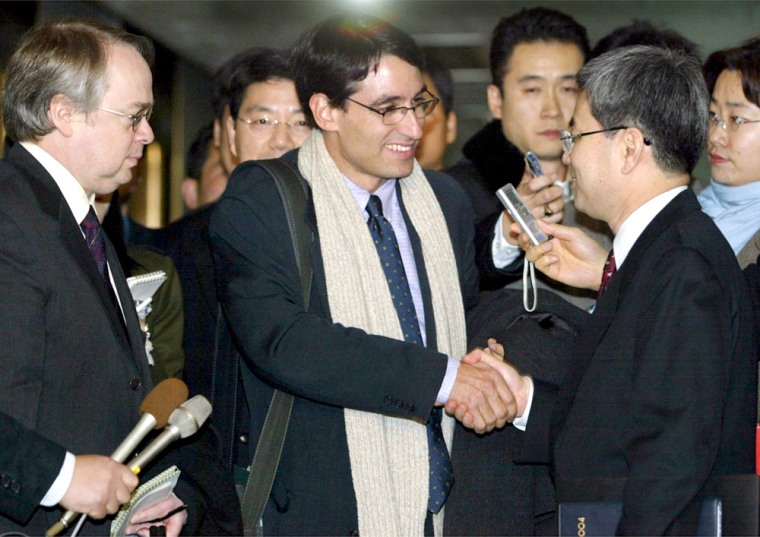U.S. congressional aides who earlier visited a secretive North Korean nuclear plant met with South Korean officials on Monday to discuss the communist country’s nuclear program.
The two staffers for the U.S. Senate Foreign Relations Committee were part of a team that went to the Yongbyon nuclear facility last week — the first visit there by outsiders in more than a year.
North Korea said Saturday it had showed them its “nuclear deterrent,” but it was unclear whether that meant an atomic bomb, its weapons making technology or something else.
The two aides, Republican aide Keith Luse and Democratic colleague Frank Jannuzi, have so far refused to give details on what they saw, saying it would be premature to draw conclusions. They were the first outsiders to visit the Yongbyon facility since U.N. inspectors were ejected in late 2002.
Details to be made public next week
Luse said more details would be made public at a Jan. 20 hearing of their Senate committee.
“We have had a full day of meeting with South Korean officials,” Jannuzi said after meeting Unification Ministry official Park Chan-bong. “We have had very fruitful consultations and discussions. We hope that our visit here helps to continue the tradition of strong coordination between Washington and Seoul and contribute to the success of six-party talks.”
On Monday, a spokesman of North Korea’s Foreign Ministry reiterated that the country was willing to freeze its nuclear activities at Yongbyon in return for oil supplies and economic aid from the United States.
North Korea has said agreement would be a first step in restarting talks between the United States, Russia, China, Japan and the two Koreas that are aimed at persuading North Korea to dismantle any nuclear weapons and its weapons-development program.
“If the Bush administration is willing to agree to ’freeze in return for compensation’ as the first step of package-deal solution of the nuclear issue, we are willing to freeze the nuclear activities stemming from our graphite-moderated reactor,” the spokesman told the North’s official news agency KCNA, which was monitored by South Korean news agency Yonhap.
A graphite-moderated 5 megawatt reactor is the core of the Yongbyon nuclear complex. It generates spent fuel rods laced with plutonium. North Korea restarted the reactor after expelling U.N. monitors at the end of 2002.
Report: Delegation shown reprocessed plutonium
Citing unnamed U.S. officials, the Washington Post reported the group had been shown recently reprocessed plutonium, the fuel for atomic weapons. The material had not been placed in an atomic bomb, and North Korea intimated it was willing to freeze its weapons development to resolve the crisis, the paper said.
Following Monday’s meeting with officials from South Korea’s Unification Ministry, the arm responsible for North Korean affairs, the congressional staff members were expected to meet South Korean Foreign Ministry officials.
The two Americans are to leave South Korea on Tuesday.
Their visit comes as the United States, Russia, China, Japan and the two Koreas rush to restart another round of six-nation talks aimed at persuading North Korea to dismantle any nuclear weapons and its weapons-development program. A first round ended in Beijing in August without much progress.
